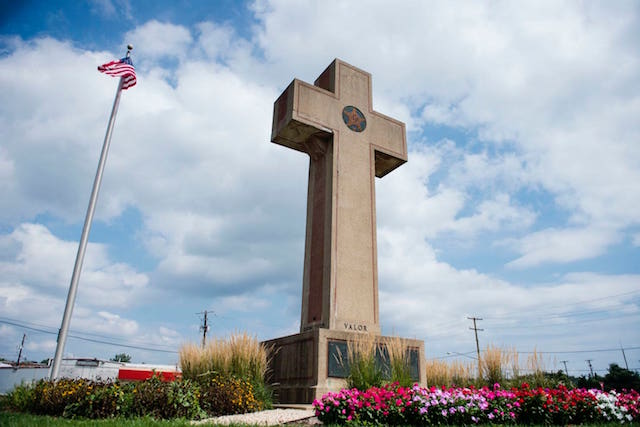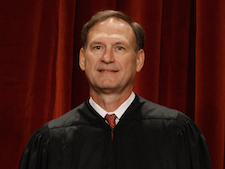“The Constitution as written, not the personal views of judges, should guide how the American people express their religious faith in the public square.” ~ Emilie Kao, Director of the DeVos Center for Religion and Civil Society
 A fine blow was struck for religious freedom, when the United States Supreme Court handed down a 7 to 2 landmark victory in the case of the American Legion v. the American Humanist Organization, on June 20th 2019, as the majority opinion determined that the Peace Cross on public land in Bladensburg, Maryland, just outside of D.C., does not violate the Establishment Clause of the U.S. Constitution. The forty foot tall Peace Cross commemorating forty-nine of Prince George’s County men who died fighting in WWI can now remain on public land, property of the State of Maryland.
A fine blow was struck for religious freedom, when the United States Supreme Court handed down a 7 to 2 landmark victory in the case of the American Legion v. the American Humanist Organization, on June 20th 2019, as the majority opinion determined that the Peace Cross on public land in Bladensburg, Maryland, just outside of D.C., does not violate the Establishment Clause of the U.S. Constitution. The forty foot tall Peace Cross commemorating forty-nine of Prince George’s County men who died fighting in WWI can now remain on public land, property of the State of Maryland.
The American Humanist Organization originally filed suit in 2012, and modified the suit in 2014; they forged ahead to force the removal of the Peace Cross, suing the Park and Planning Commission and the American Legion, that originally paid for its erection, in part. The AHO alleged that the presence of the memorial on public land amounted to a government establishment of religion.
In the beautiful shape of the Cross, the Bladensburg World War I Veterans Memorial was erected between 1919 and 1925, by Gold Star Mothers and a local American Legion post. The Cross design was provided by the Gold Star Mothers in 1919 to recall the cross-shaped grave markers standing over the thousands of American graves on the Western Front of WWI, with one mother actually referring to this memorial as her son’s “grave stone”.
This surely had to be at the front of the majority’s mind, in making their decision, since particularly troubled by opposition’s Taliban-style proposal of chopping off the arms of the Cross, Justice Samuel Alito offered the following in the decision: “Many memorials for Dr. Martin Luther King, Jr. make reference to his faith. These monuments honor men and women who have played an important role in the history of our country, and where religious symbols are included in monuments, their presence acknowledges the centrality of faith to those whose lives are commemorated.”
John Seaburn is the name of one of the soldier’s whose name is memorialized on the plaque at the base of the Peace Cross, having bravely marched off to join the Army in an all African American unit. His great-niece, Alvergia Guyton is one of the few people left with a personal connection to the Cross, stating “It’s been there all my life; it’s history“, and on June 20th seven Justices in America’s Supreme Court agreed with her, leaving John Seaburn’s sacrifice and those sacrifices of Prince George’s Native Sons intact and unsullied.
This case did little to untangle the confusion created by past Establishment Clause decisions, since two dissenters, Justice Ruth Bader Ginsburg and Justice Sonia Sotomayor, saw it as a clear violation, and those seven who did not, Justices John Roberts, Stephen Breyer, Elena Kagan, Clarence Thomas, Brett Kavanaugh, Neil Gorsuch and Alito all offered opinions that didn’t offer a fix to the underlying problem and the many different past interpretations regarding the intent of the Constitution. So, these sort of issues will continue to manifest themselves, and if anything, this case reveals the importance of Justices who view the Constitution through the prism of Original Intent.
And even though “separation of Church and State” is a fallacy and a gross misinterpretation of a passage written to the Danbury Baptist Church by Thomas Jefferson, the AHO vowed to fight on to “bolster the First Amendment” and to “[redouble their] works to strengthen the wall of separation between church and state, brick by brick.”

In her dissent, Justice Ginsberg stated: “Soldiers of all faiths ‘are united by their love of country, but they are not united by the cross … ‘ By maintaining the Peace Cross on a public highway, the Commission elevates Christianity over other faiths, and religion over nonreligion.”
America was founded as a Christian nation, and that’s just a historical fact and a matter of record, but it was founded to also be tolerant of all other religious beliefs. The Founding Fathers’ vision was a country that facilitated all Americans’ free expression of faith even if in the public square, and all across the span of our nation’s history, Americans have used religious symbols to commemorate a variety of meaningful events, whether one speaks of holidays, the Courts and sworn oaths or prayer in State legislatures.
President Trump’s appointment to the Court, Justice Neil Gorsuch rightfully suggested that the Court shouldn’t have heard the case, because the plaintiffs could show no concrete injury other than they were “offended” by seeing it as they pass it. Gorsuch wrote: “This ‘offended observer’ theory of standing has no basis in law … What matters … to assessing a monument, symbol, or practice isn’t its age but its compliance with ageless principles. The Constitution’s meaning is fixed, not some good-for-this-day-only coupon, and a practice consistent with our nation’s traditions is permissible whether undertaken today or 94 years ago.”
 Justice Samuel Alito, writing the Majority Opinion for the Court, noted: “[The Peace Cross] has become a prominent community landmark, and its removal or radical alteration at this date would be seen by many not as a neutral act but as the manifestation of ‘a hostility toward religion that has no place in our Establishment Clause traditions … The Religion Clauses of the Constitution aim to foster a society in which people of all beliefs can live together harmoniously, and the presence of the Bladensburg Cross on the land where it has stood for so many years is fully consistent with that aim. The Cross is undoubtedly a Christian symbol, but that fact should not blind us to everything else that the Bladensburg Cross has come to represent … For all these reasons, the Cross does not offend the Constitution.”
Justice Samuel Alito, writing the Majority Opinion for the Court, noted: “[The Peace Cross] has become a prominent community landmark, and its removal or radical alteration at this date would be seen by many not as a neutral act but as the manifestation of ‘a hostility toward religion that has no place in our Establishment Clause traditions … The Religion Clauses of the Constitution aim to foster a society in which people of all beliefs can live together harmoniously, and the presence of the Bladensburg Cross on the land where it has stood for so many years is fully consistent with that aim. The Cross is undoubtedly a Christian symbol, but that fact should not blind us to everything else that the Bladensburg Cross has come to represent … For all these reasons, the Cross does not offend the Constitution.”
Kelly Shackelford, president of First Liberty law firm and a defender of religious freedom, who defended the case, exclaimed: “This is a landmark victory for religious freedom. The days of illegitimately weaponizing the Establishment Clause and attacking religious symbols in public are over.”
Forever memorialized, these men were regular, ordinary Americans, doctors, farmers and laborers, educators, some in their prime and one in his fifties — already wounded — who probably shouldn’t have been on the front lines. They all had one thing in common. They never came home and they were much loved and sorely missed by those who waited for their return. And one-hundred years after WWI, Americans are still fighting for the concrete ideas these fine American patriots died to give us, the foundation of the First Amendment and its manifested inherent Freedom.
Many descendants of these fine men have lived with the Peace Cross all their lives, as it has stood gracing the skyline one mile from D.C. for nearly a century, and they are shocked to their very core that any American would challenge its right to exist, regardless of its placement on public land. Their memories include the story of the mothers who slowly pulled the American Flag from the base of the Cross ninety-four years ago to reveal the names of forty-nine soldiers, American heroes, who made the final sacrifice of their lives in World War I. It’s survived all this time, through WWII, Korea, Vietnam, Desert Storm and 9/11 and Enduring Freedom, and now, Thanks to God and the Supreme Court, it has survived its most dire threat and a terrible battle with radical, extreme atheists intent and determined to destroy this much respected and greatly loved memorial simply because it was in the shape of the Cross.
June 21, 2019
~ The Author ~
 Justin O. Smith has lived in Tennessee off and on most of his adult life, and graduated from Middle Tennessee State University in 1980, with a B.S. and a double major in International Relations and Cultural Geography – minors in Military Science and English, for what its worth. His real education started from that point on. Smith is a frequent contributor to the family of Kettle Moraine Publications.
Justin O. Smith has lived in Tennessee off and on most of his adult life, and graduated from Middle Tennessee State University in 1980, with a B.S. and a double major in International Relations and Cultural Geography – minors in Military Science and English, for what its worth. His real education started from that point on. Smith is a frequent contributor to the family of Kettle Moraine Publications.
